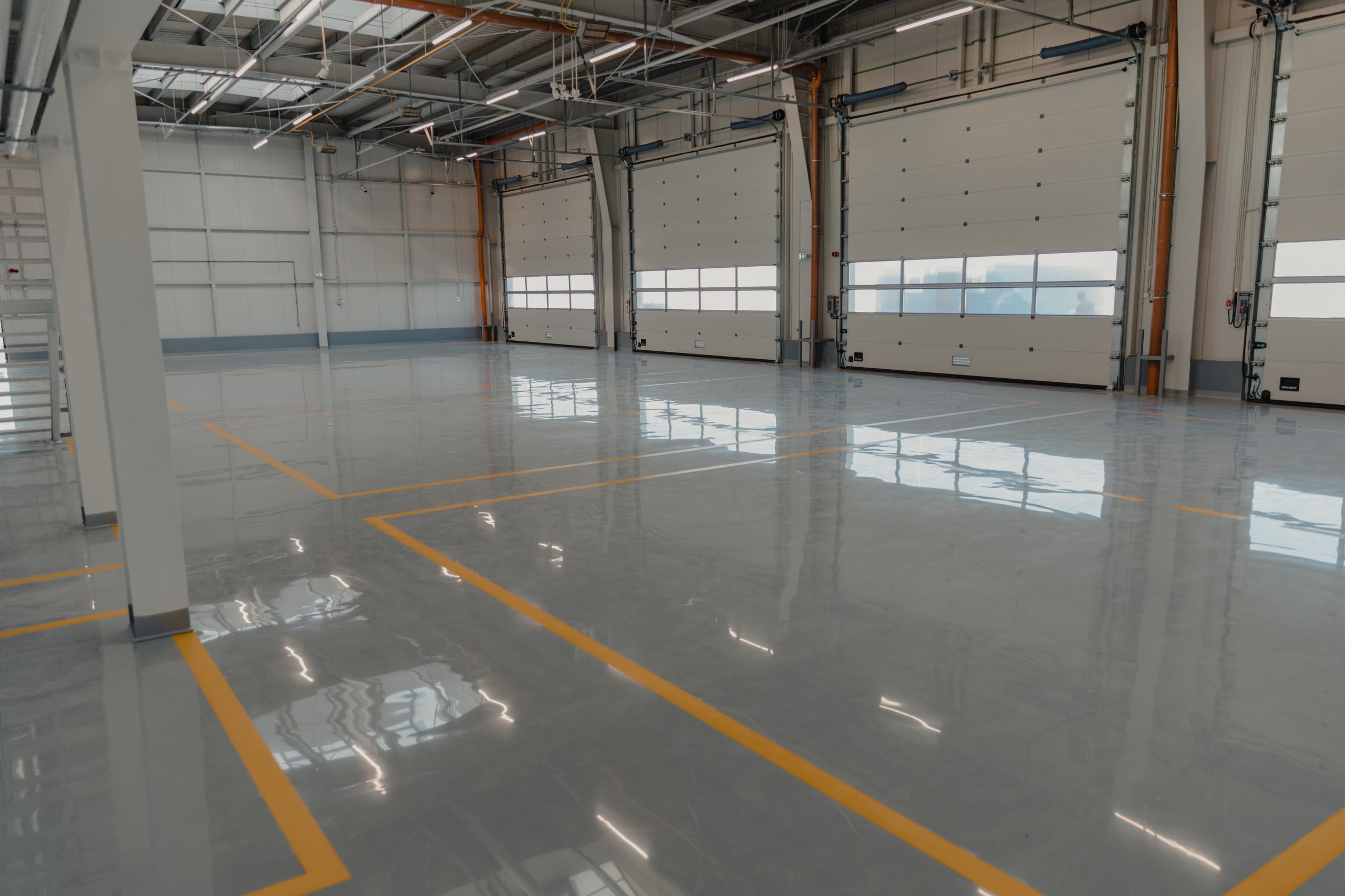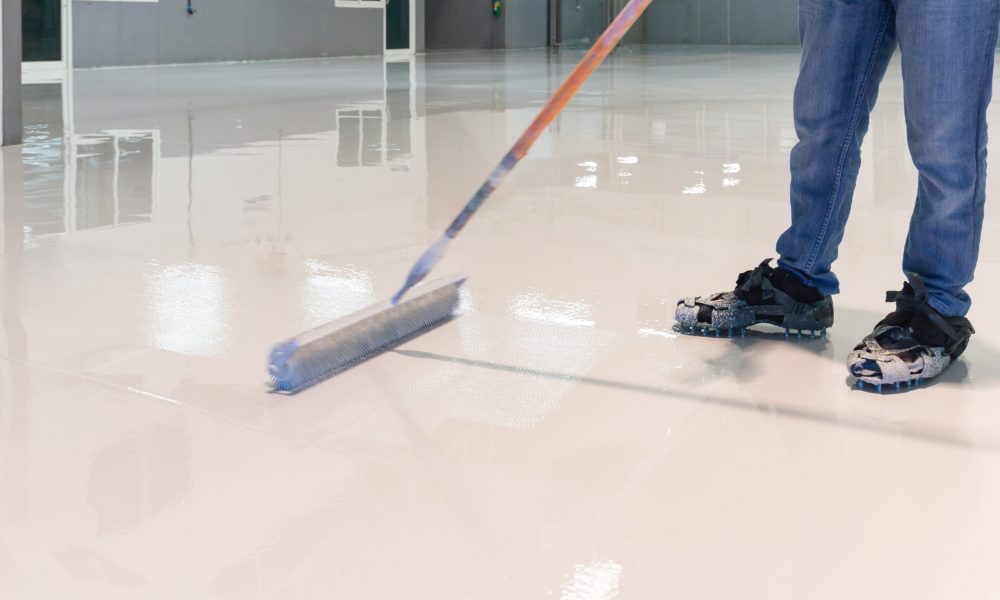
What is Epoxy Flooring?
The term epoxy is typically used as a general term for resinous flooring. There are many types of resinous flooring with each having specific purposes and benefits. Some of the different types of resinous flooring are epoxies, urethanes, urethane cements, polyaspartics, polyureas, MMA’s, vinyl esters and Novolacs. Epoxy flooring is hardly new to commercial and industrial workspaces.
Epoxy flooring systems have always been a popular option among commercial building owners and property managers, owing to their diverse range of applications and often appealing aesthetic properties.
However, if you haven’t implemented epoxy flooring in your building before, the nuances and subtleties of resinous flooring may come across as confusing to some commercial property owners.
Resinous flooring systems for industrial use are desirable for several reasons beyond their visual appeal alone. Epoxy is widely regarded for its durable properties in addition to its highly customizable and decorative features.
Epoxy flooring helps preserve the integrity of your concrete floors because it is resistant to intense levels of wear and tear, making it one of the most lasting flooring options available to industrial warehouse and commercial, industrial and office building owners.
For those just now weighing the pros and cons of resinous flooring, the commercial and industrial flooring systems team at H&H Painting Co. has put together the following guide to help explain the different epoxy resin types along with where and how to apply them in your commercial building.

Epoxy Flooring Explained
Epoxy flooring systems are composed of a synthetic resin that is typically applied on top of a concrete substrate. This type of resinous flooring technology forms not only a layer of long-lasting protection over the surface of your floors, it includes several customizable decorative options to give your building’s interior a unique aesthetic appeal.
Most resinous systems are made up of a primer and 2-5 layers of thermosetting resin. That is applied by either roller, squeegee, gauge rake or trowel. Typically applied over a concrete substrate. As the resinous layers cure, they eventually cohere to form a robust, wear and tear-resistant bond. Together, it protects your substrate from damage associated with heavy commercial and industrial use.
While there are other resinous flooring technologies out there, Epoxy is among the most widely used for commercial applications. Epoxy flooring is easily customizable, as well, offering commercial, industrial and office building floors a diverse range of decorative colors, styles, and effects.
Epoxy flooring types differ, however. Each has its own specific benefits for varied applications. The type of system you choose will ultimately depend on several factors, such as type of traffic (wheeled or pedestrian), abrasion and impact resistance required for the area, chemical exposure, cleanability, anti-slip and aesthetics. There are also coatings designed to handle thermal shock which are found in the food and beverage industry. Other factors that help determine the correct resinous system are time allotted for the install as the different types of resinous flooring have specific cure times before being allowed to be opened to traffic. End use is what really determines the type of resinous system that will be right for your facility.
Each epoxy flooring system type discussed herein has its own unique, functional, textural, and aesthetical qualities. Let’s explore them in more detail below.
The Different Types of Resinous Epoxy Flooring
Apart from durability, one of the most attractive features of resinous Epoxy flooring is its aesthetic presentation and appeal. Epoxy is a highly versatile commercial flooring solution that comes in a range of colors and styles as numerous as they are diverse.
Its resistance to wear and tear makes resinous flooring ideal for virtually any industrial or commercial application. Now, let’s take a closer look at a few common Epoxy flooring types below.
Anti Static Epoxy Flooring
Anti-static resinous flooring also known as an ESD (electrical static dissipative) coating is used in industrial commercial buildings, such as electronic parts manufacturing plants that must be antistatic compliant, an antistatic flooring system is the only dedicated solution. Also is commonly used in explosion proof areas in facilities that store flammable solvents. Anti Static Epoxy flooring is engineered to safely transfer static charges between objects and persons to defined grounding points.
These systems typically consist of a copper tape, Epoxy primer and a carbon filled urethane. They are commonly found in laboratories and specialized manufacturing facilities that need to deploy electrostatic discharge (ESD) prevention to ensure the safe and consistent functionalities of critically sensitive electronic parts that go into avionic GPS systems, for example. Anti Static Epoxy flooring is almost always discoverable in some capacity within the automotive, aerospace, and pharmaceutical processing sectors.
Epoxy Decorative Coatings
Epoxy resinous flooring has several different options to create a unique decorative finish. This can be accomplished using a flake broadcast type system which looks similar to terrazzo, quartz broadcast epoxy resinous coating system or a metallic resinous coating. With these types of systems you can create a unique looking floor to match any interior color scheme.
This system is easy to clean and best suited for light to medium-duty applications such as school cafeterias, libraries, and shopping centers that require considerable resistance to elements like foot traffic, stray edibles, and spilled chemicals.
Epoxy Self-leveling Systems
Self-leveling epoxy resinous type system usually consists of a three part mix, which includes an A side resin, B side resin and an aggregate. They are typically used when trying to repair minor defects in a concrete substrate. It Creates an attractive, usually high-gloss flooring option for commercial venues that incorporates self-leveling properties to simplify installation.
Self-leveling resinous systems typically run anywhere between 125-250 mils in thickness. This option comes in liquid form and, among the system types listed here, accounts for one of the faster, more efficient epoxy flooring installation processes.
This self-leveling formula is rich in resinous epoxy, providing a highly durable finish. It’s ideal for demanding, heavy-duty industrial environments as it can withstand significant wear and tear associated with the ongoing movements of large warehouse machinery and heavy industrial equipment.
Epoxy Overlay
For commercial building owners seeking a system that experiences medium to heavy-duty use, epoxy screeds are always a reliable option. While resinous overlays aren’t necessarily floor systems onto themselves, they frequently comprise the underlayment of heavy-duty flooring that’s finishable with any of the epoxy flooring selections listed above.
The thickness of an epoxy screed can run anywhere between 125-375 mils. The system is, therefore, typically a trowel-applied solution. Most commonly, they are applied using a screed box and with power troweled or hand troweled to achieve the smooth, consistent, and level surface required in most heavy industrial settings.
Epoxy screeds display some of the highest durability and impact resistance of all resinous flooring systems. The specifications and appearance of an epoxy overlay system are readily customizable according to your unique requirements.
Partner with H&H Painting Co. for Your Next Industrial Flooring Project
A leading supplier of industrial maintenance, painting, and flooring services in Southwest Michigan since 1932, H&H Painting Co. has a highly-skilled and specialized workforce to help you realize a successful floor project after minimal downtime.
For more details on our product options and pricing, connect with us online or contact an epoxy flooring expert by dialing 269.342.2465 now.
